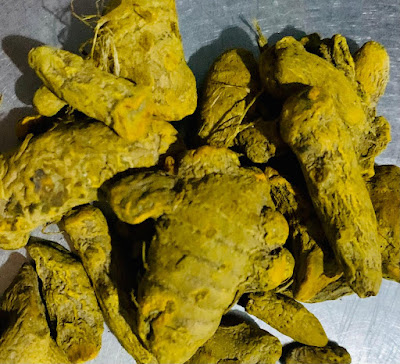Curcuma longa: Overview
Introduction:
Curcuma longa, commonly known as turmeric, is a perennial herbaceous plant belonging to the ginger family, Zingiberaceae. Native to Southeast Asia, particularly India, it thrives in tropical and subtropical climates. Turmeric plants grow to about 1 meter (3.3 feet) tall. They have large, oblong leaves and yellowish flowers. The most notable part of the plant is its rhizome, which is bright orange-yellow inside and covered with a brownish skin.The rhizome of Curcuma longa is widely used as a spice in cooking, particularly in Asian cuisines. It is also renowned for its medicinal properties, being a staple in Ayurvedic and traditional Chinese medicine. Turmeric contains curcumin, a compound with potent anti-inflammatory and antioxidant properties.


Botanical Name:
Curcuma longa
Family:
Zingiberaceae
English Name:
Turmeric
Urdu Name:
Haldi
Part Used:
Rhizome
Temparament:
Hot + Dry
Order:
3rd
Geographical Source:
Madaris, Eastern Pakistan, China, Janubi Hind, South Asia.
Organoleptic Evaluation:
Appearance; lighter yellow shades.
Taste; Bitter and distinctive taste.
Odour; Mustard- like odour.
Texture; Branched, yellow to oranged, cylindrical.
Flavour; Warm, bitter, black pepper like flavor.
Pharmacological Actions / Functions:
Anti-inflammatory activities. Anticancer, Antidiabetic, Anti-osteoarthritis, Antidiarrheal, cardioprotective, Anti-oxidative, Neuroprotective, Hepatoprotective, Anti-microbial, Renoprotective.
Specific Action:
Hepatoprotective,
Chemical Constituents:
Turmeric contains 3-6% polyphenolic compounds, collectively known as curcuminoids, which is a mixture of bisdemethoxycurcumin, curcumin, demethoxycurcumin. Curcuminoids are active components responsible for various biological actions.
Mode of Action:
1-Cardiovascular protection:
Turmeric ( Curcumin) reduces inflammation and oxidative stress ,improving cardiovascular health and reducing risk of heart diseases. Curcumin inhibits COX-2 , reducing inflammation and thrombosis and it also inhibits the ACE ( angiotensin converting enzyme) reducing blood pressure and cardiovascular role.
2-Neuroprotection activity:
The neuroprotection activity of turmeric or more specifically Curcumin, may be attributed to it’s ability to inhibit inflammatory cytokines, interleukins, chemokines and inflammatory enzymes. Modulate and interact with multiple cells signalling pathways and proteins and increase dopamine and norepinephrine levels and neural regeneration in the hippocampus, reduce Neuroinflammatory or oxidative stress.
3-Anticancer activity:
Curcumin inhibits the angiogenesis and metastasis, reducing the cell proliferation, inhibit the tumor growth. Curcumin inhibits liver cancer cell growth, reduces tumor size and increases chemotherapy effectiveness. In liver, GST( Glutathione-S-trans-ferase)Curcumin induces GST,enhancing antioxidant defenses and reducing cancer risk.
Medicinal Uses:
Curcuma longa, commonly known as turmeric, has been used in traditional medicine for centuries, particularly in Ayurveda and Traditional Chinese Medicine. Here are some of its key medicinal uses:
1.Anti-inflammatory Properties: Curcumin, the active compound in turmeric, has strong anti-inflammatory effects. It can help reduce inflammation and is often used to treat conditions like arthritis and other inflammatory diseases.
2.Antioxidant Activity: Turmeric has potent antioxidant properties, which help protect the body from damage by free radicals. This can potentially reduce the risk of chronic diseases, including heart disease and cancer.
3.Digestive Health: Turmeric aids in digestion by stimulating bile production, which helps in the digestion of fats. It’s also used to treat bloating, gas, and other digestive issues.
4.Pain Relief: Due to its anti-inflammatory properties, turmeric is often used as a natural pain reliever for conditions like osteoarthritis and rheumatoid arthritis.
5.Heart Health: Curcumin may improve endothelial function, which is the health of the thin membrane that covers the inside of the heart and blood vessels. This can help regulate blood pressure and reduce the risk of heart disease.
6.Anti-cancer Properties: Some studies suggest that curcumin can inhibit the growth of cancer cells and even reduce the spread of certain types of cancer.
7.Skin Health: Turmeric is used to treat various skin conditions such as acne, eczema, and psoriasis. Its anti-inflammatory and antimicrobial properties help in healing and soothing the skin.
8.Brain Health: There is some evidence that curcumin can cross the blood-brain barrier and may help in the treatment of neurodegenerative diseases like Alzheimer’s disease by reducing inflammation and oxidative stress in the brain.
9.Diabetes Management: Turmeric may help manage diabetes by improving insulin sensitivity and reducing blood sugar levels.
10.Liver Health: It can help detoxify the liver and improve its function, aiding in the treatment of liver diseases.
Compound Preparations:
Turmeric Curcumin Capsule, Amrit Haldi Drops, Haldi Tablets, Turmeric Caplet, ultra Turmeric Tablets, Wanderlust Turmeric liquid.
Dosage:
1 to 3 gram.
Corrigents:
Arq e lemon, Tarang.
Tenedium:
Mujeeth.
Side effects:
Turmeric Use in excessive amount can cause Dermatitis, Gastrointestinal discomfort, Liver Complications, Allergy reactions etc.
Prescription:
1-For Anti-Inflammatory (Arthritis, Joint pain, Uric acid)
Curcuma Longa (Haldi) 15g
Zingiber officinale (Sunth) 15g
Colchicum Autumnale (Suranjan Shirin) 15g
Long Pepper (Filfil Daraz) 10g
Make a powder and fill the capsule.
Usage: 1 capsule after meal with milk (BD).
Conclusion:
Curcuma longa is a versatile plant with significant health benefits, especially due to its active compound, curcumin. While it is generally safe for consumption in culinary amounts, those considering turmeric supplements should be aware of potential side effects and consult healthcare professionals as needed.
